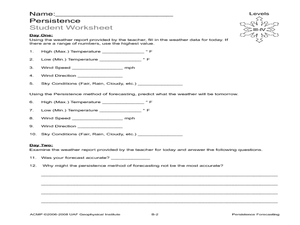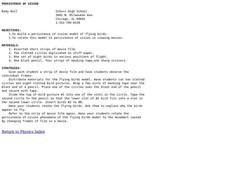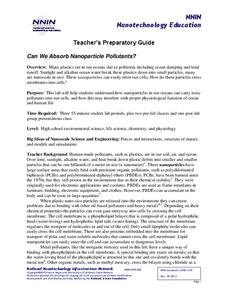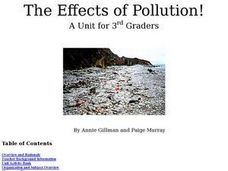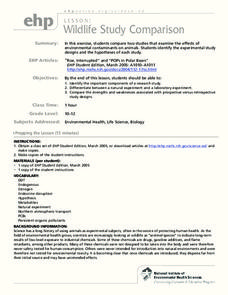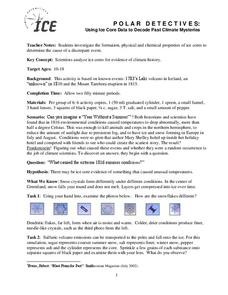Curated OER
Persistence Forecasting
Learners study weather forecasting. In this weather instructional activity, students explore forecasting weather methods and do a forecast. Learners study weather reports and discuss the elements of a forecast. Students study the method...
Curated OER
PERSISTENCE OF VISION
Eighth graders explore how vision effects viewing. In this vision instructional activity students build a persistence of vision model of flying birds.
Nuffield Foundation
Measuring the Vitamin C Content of Foods and Fruit Juices
Are you getting enough vitamin C? Young scientists determine the amount of vitamin C in fruit juice samples. They accomplish this task by adding DCPIP solution to the samples until the blue color of the DCPIP persists. Once this happens,...
Howard Hughes Medical Institute
The Making of the Fittest: Evolving Switches, Evolving Bodies
How did the stickleback fish, which was once ocean bound, evolve to be able to persist in freshwater lakes? Hear from the scientists who identified the genes and related switches that allowed these survivors to adapt. In addition to the...
Curated OER
Magic Wand
Pupils observe how an image falling on a CCD array is divided into individual pieces, by the property of persistance of vision.
Curated OER
Analog Forecasting
Young scholars recognize the elements of an analog weather forecast. In this weather forecasting lesson plan, students use a website and look for trends, persistence and climatology in weather forecasting. Young scholars...
Curated OER
Life Systems- Interacting Organisms
Participate in a life science unit that examines the relationships of living organisms to each other and to their environment as well as the student's role in the cycle of life. Through hands-on activities, research, and scientific...
Curated OER
Persistence of Vision Tube
Students demonstrate how individual pieces of data combine to produce complete images.
Curated OER
Climatology Forecasting
Students make weather predictions using the climatology method. In this climatology lesson, students review using trends and persistence when forecasting weather. Students discuss the climatology method for forecasting and complete the...
Curated OER
The Science of Color and Light
Learners listen to a story about colors and then conduct various experiments to determine how people see colors, identify which colors stand out best from a distance, show the results of mixed colored lighting and explain the phenomenon...
Curated OER
Observing, Describing, And Identifying Contrails
Students compare the three types of contrails that are produced by aircraft exhaust. They examine pictures of contrails on the internet to classify each as short lived, persistent or persistent spreading. They then sketch examples in...
Curated OER
Animals Abound Pre/Post Assessment
Learners prepare for or evaluate their experiences in learning about animal persistence. This is part of a multi-segmented unit on animal living, adaptation, and survival.
Howard Hughes Medical Institute
Got Lactase? The Co-Evolution of Genes and Culture
Does the human body evolve as quickly as human culture? With a stellar 15-minute video, explore the trait of lactose intolerance. Only about 1/3 of human adults seem to still have the enzyme lactase and therefore, the ability to digest...
Howard Hughes Medical Institute
The Making of the Fittest: Got Lactase? The Co-evolution of Genes and Culture
Got milk? Only two cultures have had it long enough to develop the tolerance of lactose as an adult. Learn how the responsible genes evolved along with the cultures that have been consuming milk. This rich film is supplied with a few...
Earth Day Network
Staying Green While Being Clean
Clean up the environment with a lesson that focuses on replacing hazardous cleaning supplies with green, environmentally-friendly products. Using a dirty patch of surface as a control area, kids clean other parts of various surfaces...
National Nanotechnology Infrastructure Network
Can We Absorb Nanoparticle Pollutants?
Just because we can't see it doesn't mean it isn't there! A growing concern for environmental scientists is toxic nanoparticles in our air and water. Young scholars conduct an experiment to demonstrate how these particles can cross our...
Curated OER
Light 3: All Those Seeing Color, Say Eye!
Students explore the nature of light. They use on-line articles and a worksheet to explore the roles of the eye and brain in the perception of color. They draw and label a diagram illustrating the movement of light.
Curated OER
The Effects of Pollution!
Learners examine pollution and how it affects the environment. They discuss how human activities lead to more pollution. They talk about the importance of recycling. There is a skit, resource links, and activities provided to make this a...
Curated OER
Wildlife Study Comparison
Environmental science classes read articles about two different scientific studies. One is about the effects of contraceptive chemicals on fertility, and the other is about how a pesticide may be reducing bone density in exposed...
Curated OER
Radiation Comparison Before and After 9-11
Using the NASA website, class members try to determine if changes could be detected in cloud cover, temperature, and/or radiation measurements due to the lack of contrails that resulted from the halt in air traffic after the attacks...
NOAA
A Laboratory Simulation of Ocean Surface Currents
Stimulate interest in ocean currents with a simulation. The first installment of a five-part middle school series teaches future oceanographers about the forces that interact to cause ocean currents. A simulation shows how wind and...
Virginia Department of Education
Owl Family Natural Selection
How do genetic mutations within a population lead to future variations? Provide your class with the resources to answer this question and more upon completing an activity on natural selection. The entire class participates in a...
Polar Trec
Polar Detectives: Using Ice Core Data to Decode Past Climate Mysteries
How does examining an ice core tell us about weather? Learners set up and explore fake ice cores made of sugar, salt, and ash to represent historical snowfall and volcanic eruptions. From their setups, scholars determine what caused the...
University of Colorado
Great Red Spot Pinwheel
The great red spot on Jupiter is 12,400 miles long and 7,500 miles wide. In this sixth part of a 22-part series, individuals model the rotation of the Great Red Spot on Jupiter. To round out the activity, they discuss their findings as a...
Other popular searches
- Habits of Mind Persistence
- Persistence of Vision
- "Habits of Mind" Persistence
- Persistence Metaphor
- Value of Persistence
- Lesson on Persistence
- Effort and Persistence
- Persistence Quiz
- Persistence Lesson Plan
- Habits of Mind" Persistence
